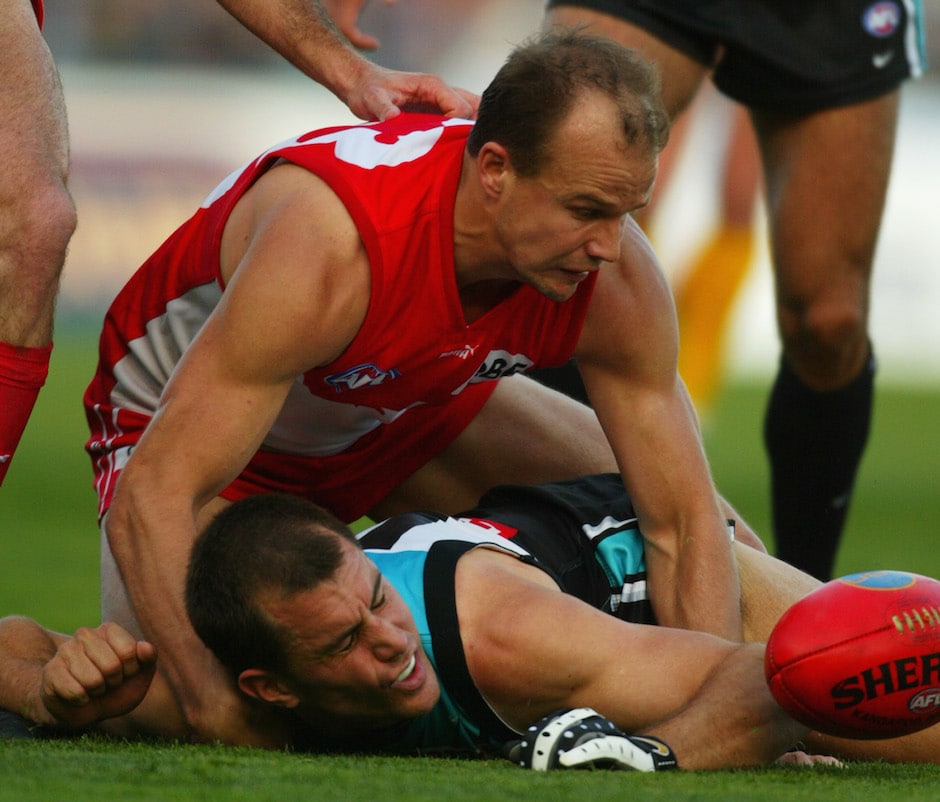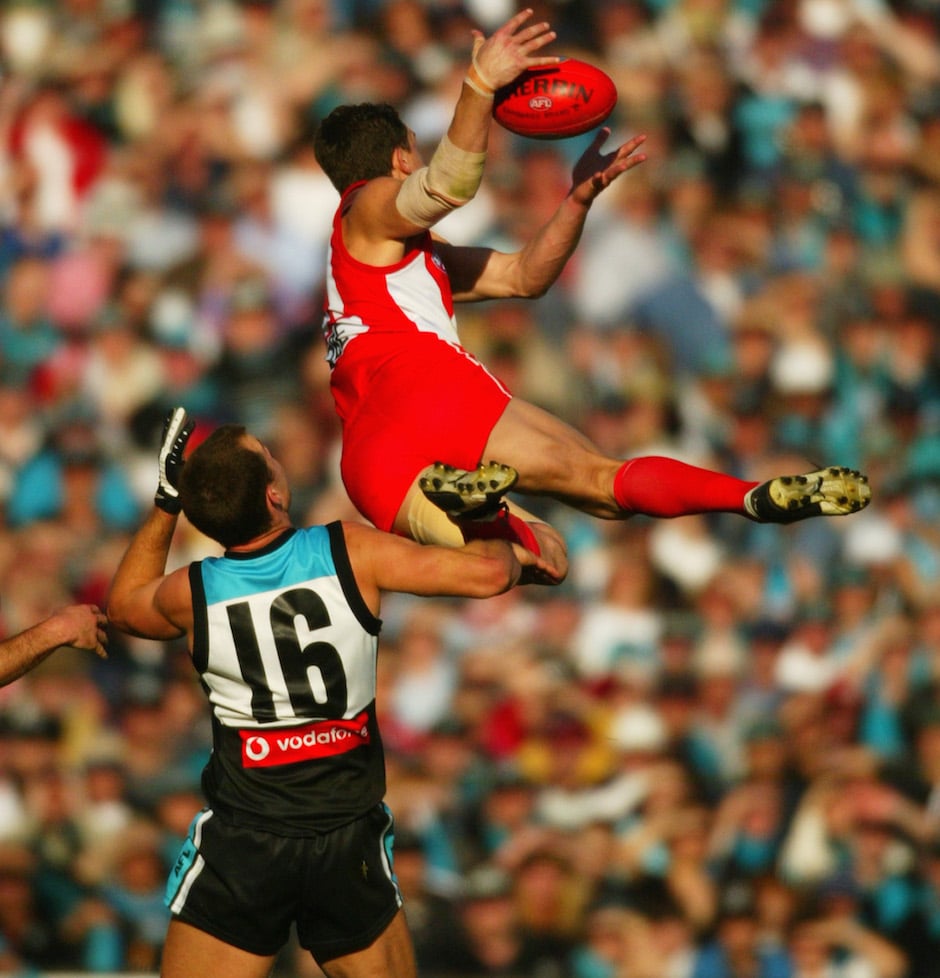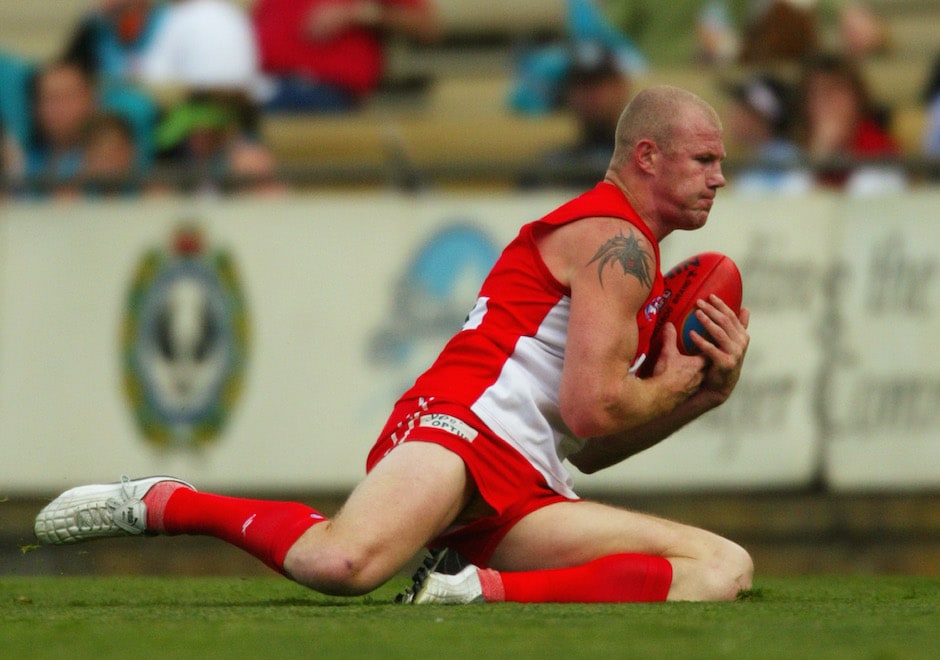In a series new to 2019, we revisit moments in history involving the Sydney Swans’ round-by-round opposition.
History, nostalgia and memories form a special part of what makes Australian rules football great, and we hope the Footy Flashbacks series reignites some of your fondest Swans moments.
In the latest edition, we wind back time to the day Sydney clinched one of the greatest against-the-odds victories in club history in a 2003 qualifying final against Port Adelaide.
Former Sydney Swans utility Matthew Nicks remembers it as a win deserving of a plaque.
Sydney arrived at Football Park for its 2003 qualifying final against Port Adelaide with a team decimated by injury.
The Swans’ most experienced forward, Michael O’Loughlin, had been struck down by a torn hamstring, ruckman Jason Ball was unavailable due to a shoulder injury and Ryan O’Keefe and Jason Saddington were also confined to the injury ward.
The avalanche of injuries didn’t end there, with Tadhg Kennelly, Brad Seymour and Stephen Doyle all finishing the day early, leaving the Swans with just 19 fit players, while Daryn Cresswell had passed a late fitness test.
Making a farce of the situation was the fact coach Paul Roos even led his team on crutches, having ruptured his Achilles tendon in a game of basketball six days earlier.
But in one of the greatest against-the-odds victories in Swans history, Sydney would surge to a 12-point win over Port Adelaide to book its place in a preliminary final against the Brisbane Lions.
Nicks said the Swans’ 15.10 (100) to 13.10 (88) victory made for a golden moment in club history.

Sydney Swans utility Matthew Nicks hunts the footy.
“A lot of clubs now put up plaques in memory of games. Internationally, teams like the New England Patriots do it. It’s not necessarily a grand final that’s put on the wall; it’s games that build up to that or moments within games. And that 2003 qualifying final would be one of those ones,” Nicks told Swans Media.
“If your coach is on crutches, you’ve got a stack of players out and then you lose more players during the game but somehow manage to win, it is the sort of game you’d put on a plaque on the wall.
“It was against all odds. In those games where you’ve got a whole heap of players out injured, the coach is trying really hard to instil that belief in the team that you can still get the job done. Then to lose more players in the game can be really zapping. It can be really zapping when you see a player go down and particularly if it’s a quality player. So that win against Port was massive in the grand scheme of things.”
Adding to the formidable challenge facing Sydney was a 33,968-strong crowd dominated by parochial Port Adelaide supporters.
“I remember the build-up to any game you’re playing in Adelaide – and that was because it was always very hostile,” Nicks said.
“Back in the day, playing at Football Park was one of the toughest road trips against either the Crows or the Power, so we knew we’d be up against it.”
But the Swans, riding the Bloods culture established under Roos during the 2003 pre-season, embraced the ferocity of the crowd.
“It’s either you thrive in that heated environment or you implode and end up giving up,” Nicks said.
“It’s an us-against-the-world mentality going into those games. Nowadays you’d compare it to playing West Coast over in Perth where you know 40-50,000 are going to be barracking for West Coast. It’s similar if you’re travelling interstate to play Collingwood in Melbourne; it’s going to be a tough day. But your goal in those games is to quieten the crowd and you enjoy the silence.”

'Leapin' Leo': An omen for West Coast Eagles fans.
While Sydney raced to three goals to Port Adelaide’s one over the opening 15 minutes of the match, it was the second quarter that set up the Swans for victory.
They led by just eight points at quarter-time before piling on seven second-term goals to the Power’s one to take a 40-point buffer into the long break.
Powerhouse Sydney forward Barry Hall was unstoppable in a six-goal blitz, including three in the Swans’ game-breaking second term.
Hall, who would finish his career with 746 goals from 289 AFL matches, had kicked just one goal over the previous two games and was clearly intent on redemption.
Nicks said a firing Hall was a glorious sight.
“He was awesome. He was a super talent, so you could rely on him to do the job in a one-on-one battle,” Nicks said.
“But more importantly, you knew he had everyone’s back. You always knew that no matter, whether you were winning or losing, that he was never going to give up and that he would always fight to the end. If there were ever any issues he’d stick up for his mates.
“But he’d also fight for every ball that came his way. He was a great player to play alongside, and it was always a lot easier if you had blokes like that on your team.”

Juggernaut Sydney Swans forward Barry Hall.
Nicks was drafted to Sydney from SANFL club West Adelaide at the end of 1994, and in 2005 he’d retire with 175 AFL games beside his name.
Agonisingly, injury forced the South Australian into retirement in August, less than two months out from the Swans’ first premiership in 72 years.
Fourteen years on, Nicks is lending his knowledge to Sydney’s cross-city rival.
The former Swan joined GWS’s coaching panel ahead of season 2019 after an eight-year stint at Port Adelaide.
Away from footy, a happy Nicks says family life is “all-consuming”.
Nicks and his wife Courtney are raising three children in Sydney’s west: five-year-old Ethan, three-year-old Isla and two-year-old Harry.
He’s not pushing any of his kids to one day don the red and white, but he would love to see it happen.



